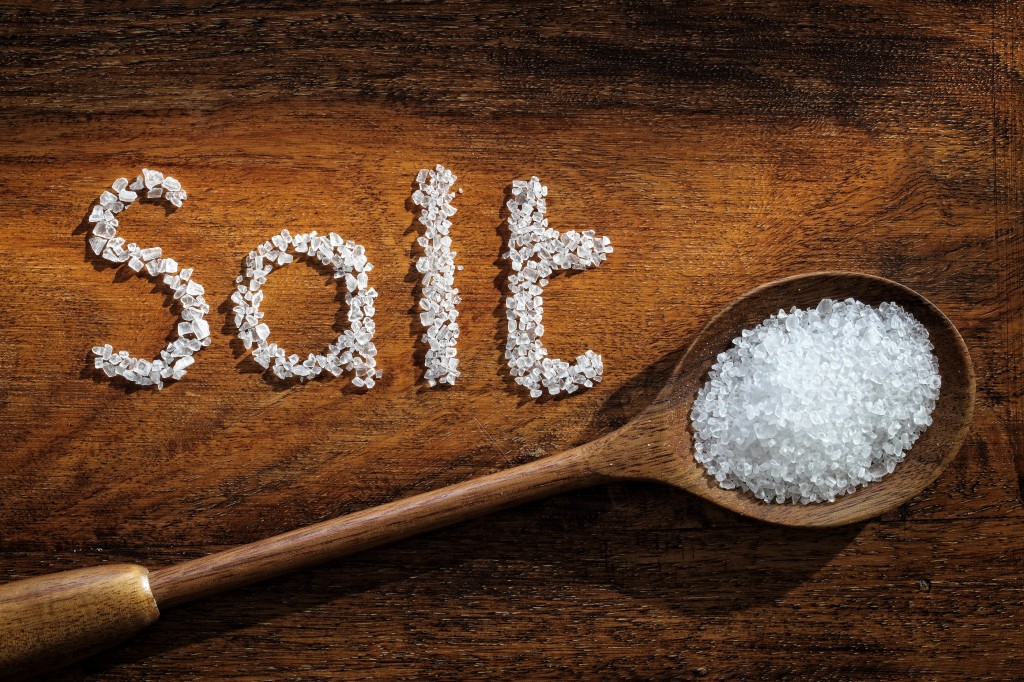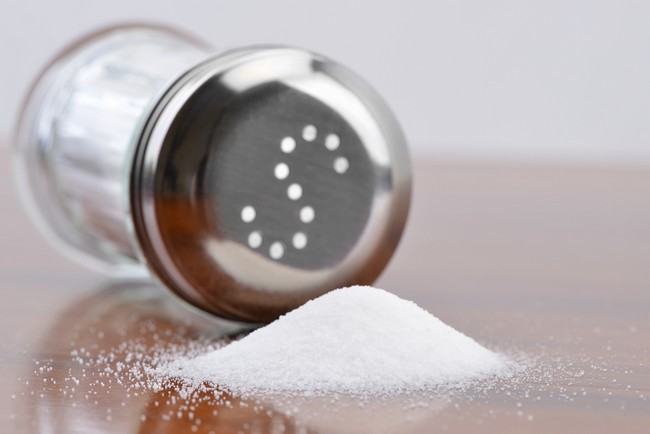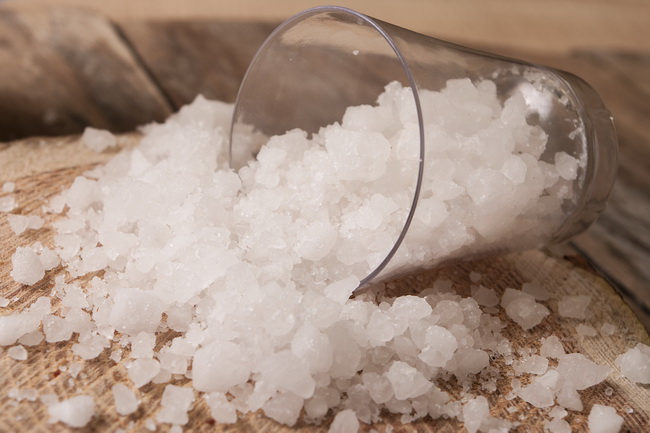- Make It Yourself Lavender Heart-Shaped Bath Bombs!
- 20 Things You Never Knew About “Down There”
- 12 Best Foods For Those Suffering From Arthritis Pain
- 12 Personal Hygiene Mistakes Almost Everyone Makes (Mom Never Told You About #4!)
- 15 Medicinal Plants And Herbs From The Cherokee People
- 12 Mind-Blowing Benefits Of Drinking Coconut Water During Pregnancy
- 12 Outstanding Winter Foods That Won’t Fatten You Up Like A Christmas Turkey
Mind Blowing Signs You Are A Salt Addict (And What To Do About It)

Photo credit: bigstock.com
Although salt is a mineral that is vital for a normally functioning human body, our modern day diets contain far too much of it. Short term consumption of excessive amounts of salt can lead to an increase in blood pressure. With more time, hypertension leads to heart disease, stroke, and many years of high salt consumption can lead to osteoporosis.
The suggested salt consumption for the average adult is 6 grams each day. Our current lifestyle and eating habits usually double this amount.
But what can you do if you simply love salt? Are you a salt junkie? Do you add salt to your salads? Vegetables? Citrus fruits? When you sit down to eat, before you do anything else, do you reach for the salt shaker?
Salt does add flavor to foods, it’s a fact of life. But there are plenty of other ways you can flavor food minus that shaker on the table. Speaking of that shaker on your kitchen table, what is in there exactly? We are going to talk a bit more about that later. Right now, let’s look at the top signs that you are consuming too much salt.
1. Bloating
Of course, eating too much of certain foods leads to bloating. But if you didn’t eat 6 bean burritos for lunch and you are still feeling bloated, you might be leaning too hard on the old salt shaker. Salt causes the body to retain water. This is because your body is trying to dilute the salt with water. Lots of water. This can make you feel bloated, uncomfortable, and unattractive.
Continue to Page 2

Photo credit: bigstock.com
2. Edema
The number one cause of swollen feet, ankles, and calves is excess salt consumption. As we mentioned, your body will retain water in an attempt to dilute the salt. This extra water builds up in the tissues, causing swelling. Swelling of the extremities is called edema. One of the best ways to reduce swelling is to cut back on your salt consumption.
3. Cravings
Do you often get cravings for salty foods? This is one of the most common signs of an addiction to salt and the overconsumption of it.
4. Excessive Thirst
Sometimes this is a sign of other problems, such as diabetes, but it could also be a sign that you are eating too much salt. As we mentioned, your body will try to fix the problem by diluting the salt in water. This will make you pee out more salt. If you find that you are drinking quite a bit more than you think you did before, or if you drink a glass of water or two and find that you are still thirsty, you should visit your doctor. You might simply be consuming too much salt but this is also one of the first signs of diabetes.
5. Hypertension
One of the things that salt does is make your body hold more water. This extra water raises your blood pressure. This higher pressure puts a great deal of strain on your kidneys, heart, arteries, and brain. To cope with this extra pressure, the very small muscles in the artery walls become thicker and stronger. This might sound like a good thing, but it really isn’t. This makes the space inside your arteries even smaller, which raises your blood pressure even more.
Many people never even realize that they have a problem with their blood pressure, or that they are salt addicts, until they have a blood test and have their blood pressure checked at their doctor’s office.
The short term pleasure of eating too much salt is not worth the long term health effects. We touched on the health effects, but let’s take a real look at what those are.
- Kidney Stones – A high consumption of salt makes the kidneys work harder. Your kidneys are unable to remove all the salt in the body and begins to form stones made form calcium and salt. Excessive salt consumption is known to be one of the most damaging things you can eat, as far as your kidneys are concerned.
- Osteoporosis – For most people, your diet plays a vital role in whether or not you will develop osteoporosis or in your ability to reverse osteoporosis. When you eat a lot of salt, it increases the amount of calcium in the urine. If you are not consuming sufficient amounts of calcium, your body will release it from your bones and teeth.
- Cancer of the Stomach – We mentioned high blood pressure, but did you know that eating too much salt is one of the leading causes of stomach cancer? There is a very high rate of stomach cancer in Japan, mostly due to their salty diet, which is made up of a great deal of pickled foods and other types of salted meats and fish. The American Journal of Clinical Nutrition published a study in 2010 which found that a diet high in salt increases a person’s risk of developing stomach cancer by 10 percent.
Continue to Page 3

Photo credit: bigstock.com
How do you get off of the salt train?
First, focus on your diet. If you are consuming a great deal of processed foods, junk foods, or fast food, you are definitely getting too much salt. Replacing most of your processed meals with wholesome, home cooked meals gives you control over your salt intake.
Next, read those food labels. For times when you cannot avoid processed foods, always choose low-sodium options.
Look at other seasoning options. There are great many other choices in the world besides salt. Many people enjoy garlic and herb seasoning choices. You can try wine vinegar, balsamic vinegars, hot peppers, or fresh lemon and lime juice. There are numerous options in the spice aisle of your favorite supermarket.
READ ALSO: What is the Difference between Table Salt, Kosher salt, Sea Salt, and Himalayan Salt?
Now, let’s talk about that salt shaker
Most people opt for salt that doesn’t come from a natural source. The salt you probably buy in those blue containers with the little girl holding an umbrella has been so highly processed. It has very little resemblance to natural salt. It is loaded with anti-caking agents so that it won’t become sticky, in addition to preservatives, and anti-absorbing chemicals. Yuck.
The good news here is that you do need some salt so you should be certain that when you do decide to grab that salt shaker, it’s a healthy, natural salt.
Himalayan salt comes from the second largest rock salt mine in Pakistan. This type of salt has 84 natural minerals and other elements that are vital to our health including potassium, magnesium, calcium, iron, chloride, and phosphorus, just to name a few. Pink Himalayan salt has even more minerals, such as zinc, iodine, copper, and selenium, which give this salt its natural pink color. You can buy this healthy, natural salt in large blocks, coarse flakes, or finely ground salt that works perfectly in your shaker.
Himalayan salt can help to balance the pH of the body, help to control water levels in the tissues of the body, regulate blood sugar levels, and helps the body absorb nutrients in the intestinal tract.
That other salt you are using can never claim that it does any of these things!
Limit your consumption of salt and change out that “little girl” salt with some Himalayan salt and see if you don’t see huge changes in how you feel.
References:




























